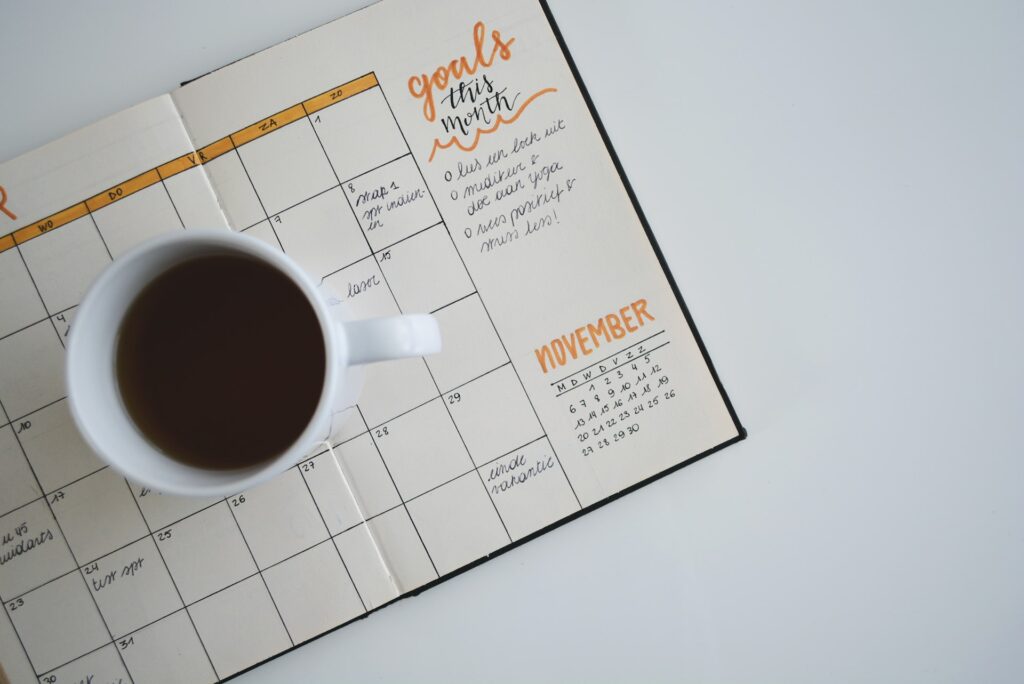Writing
How to Set Achievable Writing Goals
Do you ever struggle to stay motivated or focused on your writing? Losing motivation is one of the biggest causes of burnout among creative writers, and it’s not uncommon to feel overwhelmed or uncertain about the direction your work is taking.
Creativity requires a lot of mental effort. It’s an exhausting activity that is equally rewarding as it is hard work. There is nothing wrong with just writing for joy and dipping in and out when the mood takes you. But if you have a story you want to tell and to bring into the world, writing goals are an essential part of keeping you motivated, focused, and accountable to yourself.
The benefits of setting writing goals
No matter your aspirations as a writer, setting writing goals can have several benefits when it comes to getting the most out of your writing time and improving your craft. Diving in and writing for fun is wonderful, but at some point, you’ll want to bring your writing together into a cohesive narrative.
Writing goals help keep you focused on your work and what’s important. Knowing what you want to achieve and having a specific end goal in mind helps keep you on the right path. You’ll avoid getting sidetracked and distracted by other projects.
Seeing active progress towards a goal also helps keep you motivated and inspired. Goals are a powerful motivator, providing you with a clear sense of purpose and direction, and a real sense of achievement as you pass your milestones. And with busy lives, it’s important to celebrate every win.
Keeping yourself accountable to your goals helps you improve as you track them, and giving yourself set deadlines also helps you manage your time more effectively. Knowing what time you have available to you, and what you can realistically fit into that time, helps you make meaningful progress in your writing. Ultimately, this leads to higher-quality outputs as you write with an end goal in mind. This became incredibly clear to me when I participated in the 24-Hour Writing Challenge. Having a clear goal for each hour of writing kept me focused, and I produced better work during those hours.

How can you set effective goals?
There is an art to setting achievable writing goals. You want to keep them realistic but not so strict that it sucks all the fun out of writing. Here are some tips on how to set yourself effective writing goals that will keep you productive and creative.
Be specific
Effective writing goals require measurable outcomes. Your overall goal might be to finish a story, but taking such a broad view means there’s no clarity in how you achieve that. Instead of setting a vague goal like “write more,” be specific about it. What does your goal mean to you, and how can you measure that progress?
If you want to write more, try and determine what steps will get you there. Is it writing 100 words daily, or is it writing for at least 5 hours a week? That way, you’ll be able to measure your progress and celebrate your wins.
Make them achievable
The biggest roadblock to achieving your writing goals is setting yourself unachievable targets. Nothing will kill your motivation faster than a perceived failure, and if your goals are unattainable, then that’s precisely what you’re setting yourself up for.
By setting achievable and realistic writing goals, you’ll keep yourself motivated. You’ll be able to see yourself progressing toward something instead of constantly falling short. No one knows you better than you, so set your goals around what you can realistically achieve in your day.
Can’t write every day? No problem. Spread your goal out over a week. Don’t type fast? Measure your typing speed and determine how much you can realistically write with the time available to you.
Break them down
You can set your writing goals into smaller, bite-sized pieces to make the bigger goals less daunting and more manageable. Want to finish a novel by the end of the year? Break that down into multiple smaller goals you can track as the year progresses.
Working backwards from a big goal is an approach that works for me. I have my big goal, then I work down level by level. If my goal is to write a 75,000-word novel in six months, then I need to know what milestones I need to reach to achieve that. I break it down to a target of 12,500 words a month, then 3,125 words a week, and then at least 446 words a day.
Breaking down your writing goals not only lets you feel a sense of achievement along the way but also lets you know if your goals are achievable. If I don’t realistically have the time to sit down and write almost 500 words a day, then I know my top-level goal is an unrealistic one that I need to renegotiate.
Set a deadline
No one likes deadlines, but the unfortunate truth is that many of us don’t work at optimal capacity without one. Having a set day or time when you need to achieve a goal by helps keep you focused and accountable.
Deadlines need to be realistic, but you also need to commit to sticking to them. I find they work best for me if I have accountability buddies; people with whom I check in every week to let them know how I’m progressing. The Novlr writing community is an excellent place for that! There are lots of writers willing to ping you and check in on how you’re progressing toward your goals. Writing groups are also a great way to keep yourself accountable.
Review and adjust your goals regularly
With the best of intentions, our circumstances very rarely stay the same, so don’t be afraid to review and adjust your writing goals. You might find you have less time one month than you did another and need to rethink the amount of time you can realistically dedicate to your writing. Or you might find that you underestimated your writing speed and can actually get more done in your allocated time.
As you build a writing habit, you might also find that your output improves, and what you can get done in the time you allow becomes much easier and of higher quality. Whether you’re adjusting up or down, you should always be open to changing your goals based on new experiences, feedback, or shifts in your priorities.

Strategies to stay on track
To achieve your writing goals, you need to do more than just set them. It’s equally important to measure and track them to ensure you’re reaching your chosen milestones. You don’t have to be overly strict about it, but you do need to have a way to follow your achievements and ultimately celebrate them!
Establish a writing routine
Busy lives mean we can dedicate fewer hours in the day to writing. Not many people have the privilege of writing full-time, so setting aside time for yourself and your writing goals is essential.
Many people advocate for consistency, but that doesn’t work for everyone. While some writers may like to have a set time of day dedicated to writing, others might prefer to set goals they can achieve in between specific life tasks.
For instance, while I spend almost all day writing, writing for work is different from the writing I do for my own pleasure. My schedule isn’t always consistent, so my routine often involves doing some writing while I wait for an element of dinner to finish cooking or might dictate some ideas while taking the dog for a walk.
Your schedule is unique to you, but setting yourself a writing routine that fits into it will help you stay focused and achieve your goals much faster than simply relying on “when you can.”
Eliminate distractions
Life is hectic, but if you can, minimise distractions during your writing time. This will mean something else to every writer, so take some time to determine what distractions exist for you in the routine and time you have available to you.
It might mean turning off your phone, muting social media notifications, finding a quiet workspace, or using productivity apps. In my household, my significant other takes the dog when I sit down to write so she doesn’t bug me for attention, and he messages me when he has something to tell me so I can come and talk to him after I’m done instead of distracting me with conversation.
I have friends who can only write in uncluttered spaces and others who can only write with music playing. Whatever you need to do to get you in the zone, do your best to make it happen.
Track your progress
Don’t just keep your writing goals in your head. Write them down. Keep track of your achievements and your failures. This will not only help you keep your motivation up when you’re doing well, but also show you when you might need to renegotiate what is achievable.
Being able to visually see your progress towards a specific milestone is the best motivator out there. Use a notebook or diary if you like something physical, or keep a spreadsheet of goals and outcomes. There are also lots of productivity apps out there that you can use. I, of course, use Novlr’s built-in goal-setting feature to track my weekly streaks and set a monthly word count goal.
Whatever you use, just make sure you’re tracking your writing goals and, ultimately, celebrating your successes.
Celebrate your achievements
Celebrating yourself and your achievements is the single most important motivator in achieving your writing goals. And it is the one that is far too often ignored.
If you’ve marked off some of your milestones, celebrate that and reward yourself! You’re working hard, being creative, and doing what you set out to do. Choose how you want to celebrate your achievements and work that into your writing schedule if you have to. For instance, if you’re on track for your monthly goal, you might reward yourself with an evening off every month. Or you might buy yourself a new notebook or a fancy pen after you’re passed a set number of milestones.
You can even enlist the help of others to celebrate your successes. Organise a coffee date for a change of scenery. If you have someone you live with who has some extra time capacity, they might be willing to take a household task off your hands to give you a night off to celebrate a win. Get creative, but above all, celebrate! You deserve to be proud of yourself when you achieve your goals.
Writing is a challenging and rewarding craft. It takes persistence and self-reflection. Setting writing goals will help you make the most of the writing time you have available and go a long way to helping you grow and improve as a writer. Remember to make your goals achievable and celebrate your wins along the way. Champion yourself and your work, and every day will bring you one day closer to your writing aspirations.